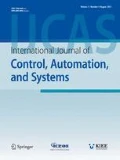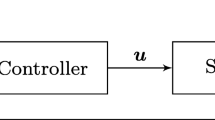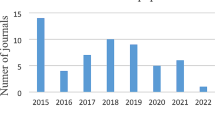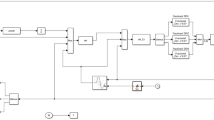Abstract
Many industrial processes can be effectively described with first-order plus fractional dead time models. In the case of plants with a large dead time relative to the time constant, approximations in discretizing the time delay can adversely affect the performance and if the sample time is enforced by system requirements, the fractional nature of the delay should be considered. In this paper, an analytical approach to model predictive control tuning for stable and unstable first-order plus dead time models with fractional delay is presented. The existing tuning methods are based on trial and error or numerical optimization approaches and the available closed form equations are limited to plants with integer delays. In this paper, an analytical approach is adopted and the issues of closed loop stability and achievable performance are addressed. Finally, simulation results are used to show the effectiveness of the proposed tuning strategy.
Similar content being viewed by others
References
C. E. Garcia, D. M. Prett, and M. Morari, “Model predictive control: theory and practice-a survey,” Automatica, vol. 25, no. 3, pp. 335–348, 1989.
S. J. Qin and T. A. Badgwell, “A survey of industrial model predictive control technology,” Control Engineering Practice, vol. 11, no. 7, pp. 733–764, 2003.
J. H. Lee, “Model predictive control: review of the three decades of development,” International Journal of Control, Automation and Systems, vol. 9, no. 3, pp. 415–424, 2011.
M. L. Darby and M. Nikolaou, “MPC: current practice and challenges,” Control Engineering Practice, vol. 20, no. 7, pp. 328–342, 2012.
E. F. Camacho and C. Bordons, Model Predictive Control, 2nd edition, Springer-Verlag, London, 2004.
K. Y. Rani and H. Unbehauen, “Study of predictive controller tuning methods,” Automatica, vol. 33, no. 12, pp. 2243–2248, 1997.
J. L Garriga and M. Soroush, “Model predictive control tuning methods: a review,” Industrial & Engineering Chemistry Research, vol. 49, no. 8, pp. 3505–3515, 2010.
J. H. Lee and Z. H. Yu, “Tuning of model predictive controllers for robust performance,” Computers & Chemical Engineering, vol. 18, no. 1, pp. 15–37, 1994.
S. Di Cairano and A. Bemporad, “Model predictive control tuning by controller matching,” IEEE Trans. on Automatic Control, vol. 55, no. 1, pp. 185–190, 2010.
R. Shridhar and D. J. Cooper, “A tuning strategy for unconstrained SISO model predictive control,” Industrial & Engineering Chemistry Research, vol. 36, no. 3, pp. 729–746, 1997.
A. R. Neshasteriz, A. Khaki-Sedigh, and H. Sadjadian, “Generalized predictive control and tuning of industrial processes with second order plus dead time models,” Journal of Process Control, vol. 20, no. 1, pp. 63–72, 2010.
P. Bagheri and A. Khaki-Sedigh, “Tuning of dynamic matrix controller for FOPDT models using analysis of variance,” Proc. of the 18th IFAC World Congress, pp. 12319–12324, 2011.
P. Bagheri and A. Khaki Sedigh, “Analytical approach to tuning of model predictive control for first-order plus dead time models,” IET Control Theory & Applications, vol. 7, no. 14, pp. 1806–1817, 2013.
J. A. Rossiter, Model-based Predictive Control: A Practical Approach, CRC Press, 2003.
M. A. Henson and D. E. Seborg, “Adaptive nonlinear control of a pH neutralization process,” IEEE Trans. on Control Systems Technology, vol. 2, no. 3, pp. 169–182, 1994. Seoul, 1989.
Author information
Authors and Affiliations
Corresponding author
Additional information
Peyman Bagheri was born on December 1984 in Tabriz, Iran. He obtained his B.Sc. degree in Electrical Engineering from the Sahand University of Technology in 2007, masters in Control Engineering from K. N. Toosi University of Technology in 2009 and he is currently a Ph.D. student at the K. N. Toosi University of Technology. The main areas of his interest are model predictive control, controller tuning, multivariable control, process control and pH control.
Ali Khaki-Sedigh is currently a professor of control systems with the Department of Electrical Engineering, K. N. Toosi University of Technology, Tehran, Iran. He obtained an honors degree in mathematics in 1983, a master’s degree in control systems in 1985 and a Ph.D. in control systems in 1988, all in the UK. He is the author and co-author of about 90 journal papers, 170 international conference papers and has published 14 books in the area of control systems. His main research interests are adaptive and robust multivariable control systems, complex systems and chaos control, research ethics and the history of control.
Rights and permissions
About this article
Cite this article
Bagheri, P., Khaki-Sedigh, A. Closed form tuning equations for model predictive control of first-order plus fractional dead time models. Int. J. Control Autom. Syst. 13, 73–80 (2015). https://doi.org/10.1007/s12555-014-0007-6
Received:
Revised:
Accepted:
Published:
Issue Date:
DOI: https://doi.org/10.1007/s12555-014-0007-6




